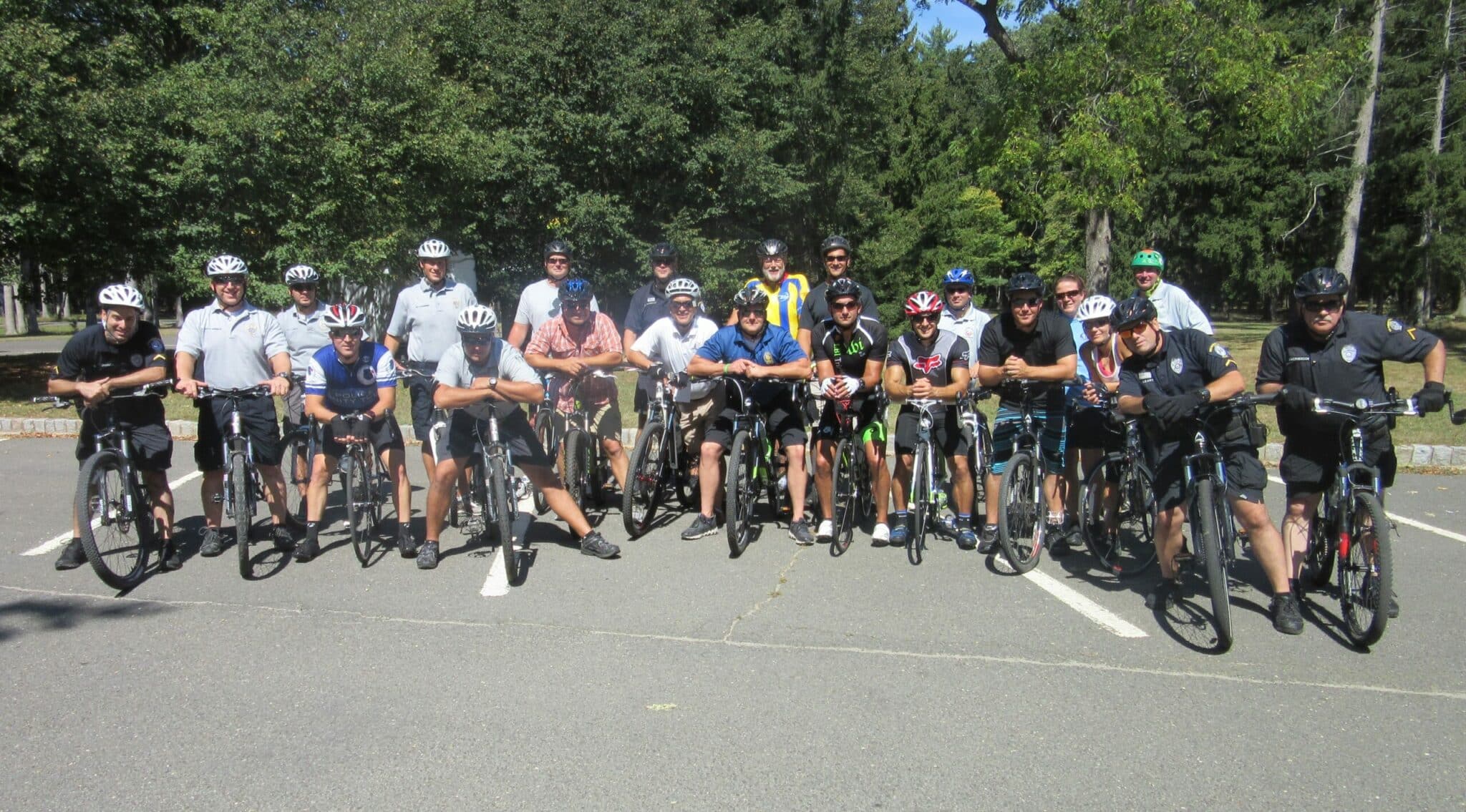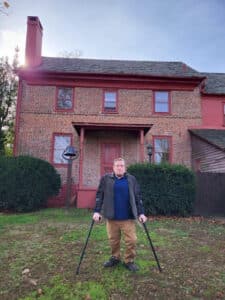by Aaron Hyndman
A new course offered by the New Jersey Bike & Walk Coalition and Voorhees Transportation Center at Rutgers University–New Brunswick provided law enforcement officers in five counties with the training necessary to help them understand how New Jersey’s motor vehicle code applies to bicyclists.
Although New Jersey law explicitly gives bicycle riders the same rights and responsibilities as drivers of motor vehicles, most people, including many police officers, tend to see the traffic flow from the perspective of a motor vehicle operator. According to Les Leathem, Education Coordinator for NJBWC and creator of the course, “in talking to officers around the state, we found that many of them don’t realize the difference in the way traffic appears to a bicyclist. They also did not fully understand the challenges bicyclists face in dealing with motorists.”
Recent developments in towns such as Upper Saddle River have underscored the difficulties faced in enforcing the laws of the road as they pertain to bicycles. Determining whether or not bicyclists must always ride single file, establishing when a cyclist has the right to “take the lane,” and scenarios related to yielding and passing have all become points of contention as towns across the state wrestle with the mechanics of enforcing safe sharing of the road as proscribed by New Jersey law.
With their seminar, “Title 39: A Bike’s Eye View,” NJBWC and VTC equipped officers with tools they can use to be more effective in dealing with bicyclists as drivers. The courses, held in Camden, Essex, Middlesex, Ocean, and Passaic Counties in August and September, were also designed to help officers deal with motorists as well, who often do not understand that bicyclists have a right to use the road in the same way that they do.
“This program really helps law enforcement officers understand what it is like to ride a bike on the road. Instead of seeing bikes as ‘in the way,’ the course helps officers understand that bicyclists are another part of traffic,” said Arnold Anderson, Community Traffic Safety Program Coordinator at the Essex County Police Academy.
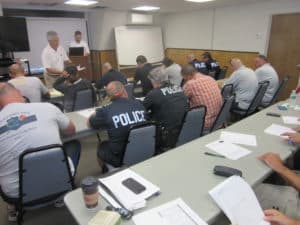 The course, developed specifically for New Jersey law enforcement officers, first addressed the so-called ‘Three E’s of Traffic Safety’: Education, Engineering, and Enforcement, in a classroom session. Officers then got on bikes to practice drills to avoid crashes, and to ride on a variety of roads ranging from low-speed, residential streets to major arterials. Their time in the saddle also took them along roads with and without shoulders so they could understand how roadway design, traffic and road conditions affect bicyclists. “The real power of this course is its dual approach: classroom discussion helps officers become more aware of the motor vehicle code as it applies to bicyclists. Then, getting the officers out from behind the steering wheel of a police car and putting them on two wheels gives them an understanding of how the world looks from the bike saddle.” said Leathem.
The course, developed specifically for New Jersey law enforcement officers, first addressed the so-called ‘Three E’s of Traffic Safety’: Education, Engineering, and Enforcement, in a classroom session. Officers then got on bikes to practice drills to avoid crashes, and to ride on a variety of roads ranging from low-speed, residential streets to major arterials. Their time in the saddle also took them along roads with and without shoulders so they could understand how roadway design, traffic and road conditions affect bicyclists. “The real power of this course is its dual approach: classroom discussion helps officers become more aware of the motor vehicle code as it applies to bicyclists. Then, getting the officers out from behind the steering wheel of a police car and putting them on two wheels gives them an understanding of how the world looks from the bike saddle.” said Leathem.
It’s a fact that the conditions of most New Jersey roadways present a less-than-ideal scenario for bike riders. “Given that most streets and roads in the state are without bike lanes, bike riders in New Jersey face the perilous task of not only negotiating difficult traffic patterns, but also having to maneuver around roadside debris and avoid cracks and potholes,” said Cyndi Steiner, NJBWC’s Executive Director. “And with our depleted Transportation Trust Fund, future road repairs and enhancements are unlikely to keep pace with demand, so it’s important that our law enforcement officers are getting a first-hand look at the hazards New Jersey’s bicyclists encounter every day,” added Steiner.
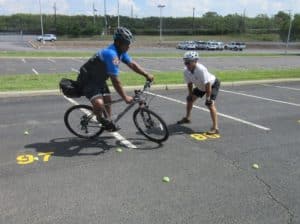 The “Bike’s Eye View” course was created by Les in consultation with police officers from around the state. Funding was provided by the NJ Division of Highway Traffic Safety and the program was administered by the Alan M. Voorhees Transportation Center at the Edward J. Bloustein School of Planning and Public Policy at Rutgers University. Classes were led by Leathem, who is also a national coach for the League of American Bicyclists, and by police officers who are LAB League Cycling Instructors as well.
The “Bike’s Eye View” course was created by Les in consultation with police officers from around the state. Funding was provided by the NJ Division of Highway Traffic Safety and the program was administered by the Alan M. Voorhees Transportation Center at the Edward J. Bloustein School of Planning and Public Policy at Rutgers University. Classes were led by Leathem, who is also a national coach for the League of American Bicyclists, and by police officers who are LAB League Cycling Instructors as well.
Police departments from across the state participated in this first course offering. With officers from Beach Haven, Collingswood, Egg Harbor Township, Elizabeth, Englewood Cliffs, Glen Ridge, Gloucester City, Howell, Livingston, Long Beach Township, Maplewood, Morris Township, Newark, Palisades Interstate Parkway Commission, Rutgers University, Secaucus, Ship Bottom, Teaneck, Toms River, and West Windsor having taken part in the training, NJBWC is committed to future efforts to expand the training to other police departments.
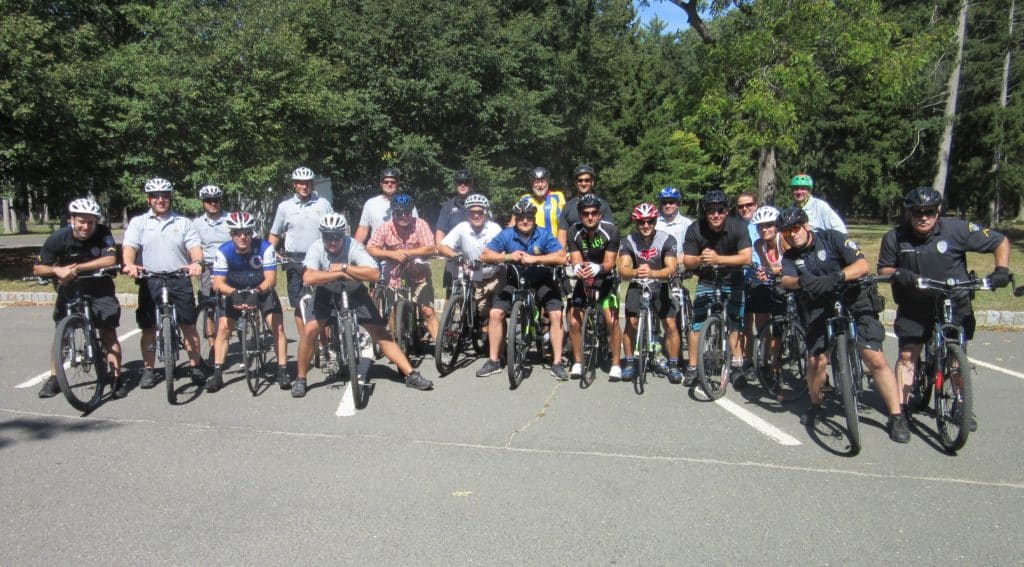
Aaron Hyndman is the Communications Coordinator for the NJ Bike & Walk Coalition.

